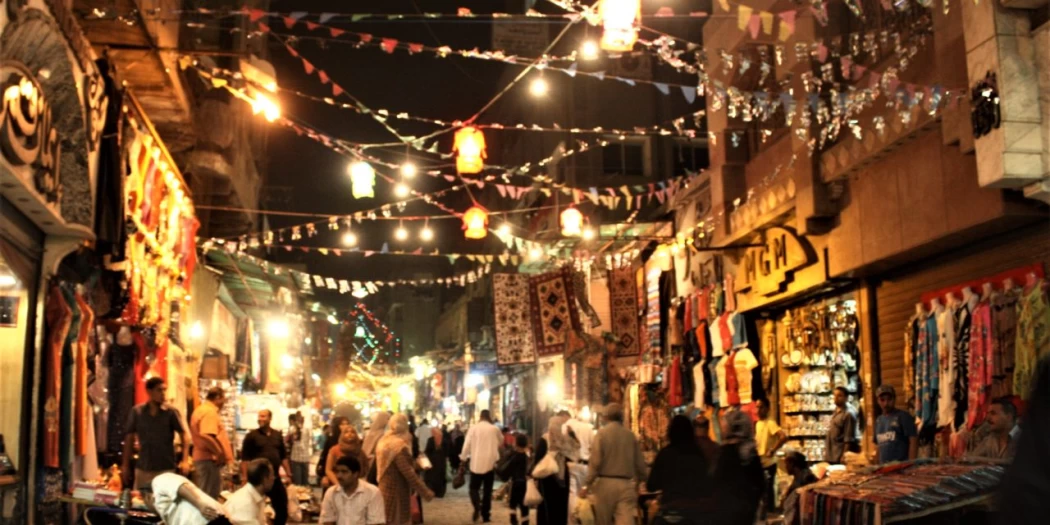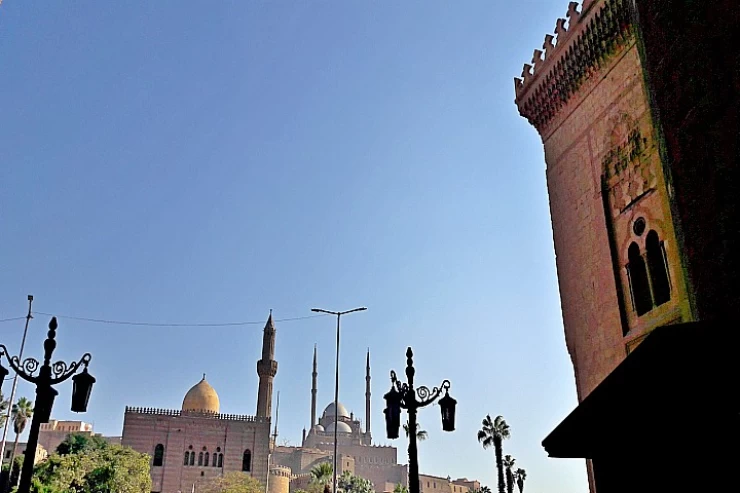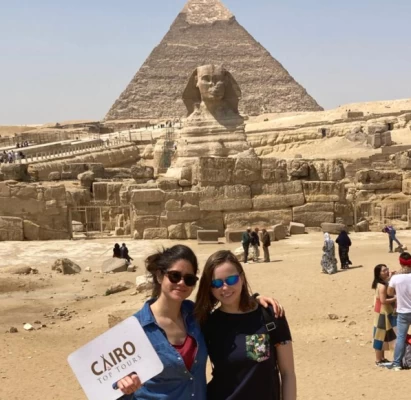
Ramadan in Ägypten
Ramadan in Ägypten
Sind Sie vollständig geimpft?
Dann müssen Sie bei Ihrer Ankunft am internationalen Flughafen von Kairo keinen PCR-Test vorlegen, um einen einmaligen Urlaub im Land der Pharaonen zu genießen.
Der arabische Monat Ramadan
Das Wort Ramadan leitet sich von der arabischen Wurzel ramiḍa oder ar-ramaḍ ab, "die brennende Hitze", "Dürre". Im Monat Ramadan wurde der Koran offenbart. Anleitung für die Menschheit, klarer Nachweis von Richtlinien, Standard (richtig und falsch).
Der Ramadan ist der neunte Monat des islamischen Mondjahres. Es ist Zeit für Fasten, Segen und Gebete, um die ersten Verse des Heiligen Korans des Propheten Muhammad durch den Heiligen Geist Gabriel zu gedenken. Es ist eine Zeit, in der Muslime bei Tageslicht nicht essen, um sie an die Herausforderungen der Armen zu erinnern.
Trotz der ähnlichen Zeiten an sich unterscheiden sie sich in der Güte und der Führung, die in ihnen stattfindet, und Gott der Allmächtige hat den gesegneten Monat Ramadan mit einer Reihe von Vorteilen herausgegriffen, die ihm ein Heiligtum einbringen und den Appetit der Menschen auf Gutes steigern arbeitet dabei,
Wenn Sie Ihre Reisen nach Ägypten während des Ramadan planen, werden Sie feststellen, dass eines der Merkmale des Monats darin besteht, dass Gott der Allmächtige sein weises Buch offenbart hat, um die Herzen zu reinigen und den Geist mit Weisheit zu füllen, wohin Gott der Allmächtige den Heiligen Koran gesandt hat.
Ein bis zum untersten Himmel in einem Satz oder der Beginn der Herabkunft des Korans darin, dann wurden seine Verse offenbart, je nachdem, was die Weisheit Gottes, des Allmächtigen, erfordert und was den Monat Ramadan auszeichnet, den Gott der Allmächtige auferlegt hat Muslime,
die während des Tages fasten Es sollte beachtet werden, dass das Fasten große Auswirkungen auf die Diener hat, da er ihre Moral reinigt, ihre Herzen reinigt und sich selbst repariert.
Das charakteristischste Merkmal dieses Monats ist die Gegenwart der größten Nacht, der Nacht der Kraft, in der der Heilige Koran unserem Meister Muhammad offenbart wurde - möge Gott ihn segnen und ihm Frieden gewähren - und seine Abstammung war in das Jahr sechshundert und zehn n.
Chr., und dann war der Gesandte - möge Gott ihn segnen und ihm Frieden gewähren - in der Höhle von Hira anwesend, und in diesem Fall wurde der Ort durch die Offenbarung Gabriels offenbart - auf ihm sei Frieden -, und der erste Vers, der ihm offenbart wurde, ist das allmächtige Sprichwort: "Lies im Namen deines Herrn, der erschaffen hat", und der Heilige Koran wurde sofort in der Nacht der Kraft offenbart, die sein Abstieg von der erhaltenen Tafel war.
Der Grund für die Benennung in diesem Monat liegt in der Tatsache, dass das Wort Ramadan vom Ursprung des Ramadan abgeleitet ist, der als Intensität und Stärke der Wärme definiert ist, und dass seine Ableitung auf dem Gewicht des Ramadan basiert, was bedeutet, dass es ist heißer geworden, und die Hitze ist in dem Sinne vergangen, dass die Hitze auf ihnen an Intensität zugenommen hat,
und zu dieser Zeit haben sie alle Namen der Monate aus der Sprache übertragen, die in den alten Tagen vorherrschte, und sie begannen zu Nennen wir es Namen, die sich auf die Zeit beziehen, und dies entspricht dem Ramadan während der Tage des Ramadan, was extreme Hitze und Stärke bedeutet, und seitdem wurde es Ramadan genannt.
Ein Muslim fastet während des Ramadan, und er ist eines der obligatorischen Gebete, die den Muslimen auferlegt wurden, und es ist eine der fünf Säulen des Islam, für die die islamische Religion nur gilt. Und dieses Timing ist für alle Teile der Erde mit einem Unterschied im Timing-Unterschied spezifiziert.
Zu den wichtigsten Vorteilen des Fastens gehört, dass es die menschliche Seele reinigt und reinigt und sich dem allmächtigen Gott nähert, indem es sich zum Fasten verpflichtet. In diesem großen Monat sind alle Tore der Hölle geschlossen und die Türen der Barmherzigkeit und Vergebung sind offen für Muslime,
Ausnahmen vom Fasten sind Reisen, Menstruation, schwere Krankheit, Schwangerschaft und Stillen. Viele Muslime mit Erkrankungen bestehen jedoch darauf, zu fasten, um ihre spirituellen Bedürfnisse zu befriedigen, obwohl dies vom Hadith nicht empfohlen wird. Wer nicht fasten kann, muss die versäumten Tage später nachholen.
Suhur ist die Mahlzeit, die Muslime am frühen Morgen vor dem Fasten (sawm), vor dem Morgengrauen während oder außerhalb des islamischen Monats Ramadan zu sich nehmen. Das Essen wird vor dem Fajr-Gebet gegessen.
Suhur wird während des Ramadan als Abendessen auf Iftar abgestimmt und ersetzt die traditionellen drei Mahlzeiten pro Tag (Frühstück, Mittag- und Abendessen), obwohl an einigen Orten das Abendessen später in der Nacht auch nach Iftar eingenommen wird.
Suhur ist die letzte Mahlzeit, die von Muslimen vor dem Fasten von der Morgendämmerung bis zum Sonnenuntergang im Monat Ramadan gegessen wird. Nach islamischen Traditionen wird Suhur als Vorteil des Segens angesehen, da es dem Fasten ermöglicht, die durch das Fasten verursachte Verschrobenheit oder Schwäche zu vermeiden. Laut einem Hadith in Sahih al-Bukhari erzählte Anas ibn Malik: "Der Prophet sagte: 'Nimm suhoor, da es einen Segen darin gibt.'"
Bei Sonnenuntergang brechen Familien das Fasten mit dem Frühstück und das Essen öffnet traditionell, wo die Leute beginnen, ihre Datteln mit Feuchtigkeit zu brechen, während sie Milch, Mondreligion und ein Getränk trinken, und einige mögen vielleicht frische Säfte wie Orangen,
Mangos trinken oder Melonen. Nach der Rückkehr vom Maghrib-Gebet beginnen die Menschen, Molokhia, Suppe und gemischtes Gemüse, Nudeln mit Becha, zu essen.
-
Erleben Sie den Zauber Ägyptens, wo alles beginnt, mit dem professionellen Team von Cairo Top Tours. Starten Sie jetzt Ihr Abenteuer und erleben Sie den besten Urlaub in Ägypten. Sie finden hier die besten Ägypten-Osterangebote und -Urlaube 2022. Der Frühling in Ägypten ist perfekt und die Atmosphäre ist unsagbar schön.
-
Wir organisieren tolle und unterhaltsame Ägypten Ausflüge wie Kairo Tagestouren. Schauen Sie sich unsere Ausflüge und Reisen mit angemessenen Preisen an, die für alle Arten von Touristen im Jahr 2022 geeignet sind, sowie Ägypten Landausflüge, zusätzlich zu Kairo Tagestouren vom Flughafen und Kairo Zwischenlandung Tour.
-
Sie können das antike Theben erkunden, beginnend mit dem Tal der Könige und dem Westufer von Luxor, sowie den Karnak-Tempel und den Luxor-Tempel. Ägypten Touren erweitern, um den Tempel von Edfu von Gott Horus der Falke, und Kom Ombo Tempel und Abu Simbel zu decken. All dies während Assuan-Tagestouren und Luxor-Tagestouren.
-
Das Rote Meer ist einer der malerischsten Orte, die Sie in Ägypten besuchen können, genießen Sie einige Meeresabenteuer und Wanderaktivitäten wie Hurghada Tagestouren und Sharm El Sheikh Ausflüge.
-
Sichern Sie sich jetzt Ihren Platz in unseren Ägypten-Reisepaketen und Wüstensafari-Trips, um von Kairo aus die Oasen Siwa, Bahriya und Farafra sowie die Oasen Dakhla und Kharga zu bereisen! Wir sehen uns wieder.
The word Ramadan is derived from the Arabic root ramiḍa or ar-ramaḍ, "the burning heat" and "drought." The month of Ramadan is when the Qur'an is revealed. Guidance for humanity, clear proof of guidelines, standards (right and wrong).
Ramadan in Egypt: A Month of Spirituality, Tradition, and Celebration
Ramadan is a time of utmost reverence for Muslims all over the world, and in Egypt, the month is even more adored by its people. It is full of fasting, prayers, charity work, and get-togethers and spans the period that celebrates the initial salutation of the Quran to the prophet Muhammad. Such is the country’s richness in her Islamic cultural values combined with the aliveness of her people’s way of life that each year during the month of Ramadan, Egypt becomes an enchanting wonderland. Where the old ways of observing the month complement the new festivities in a very beautiful way. The cities, the houses, and the temples are religiously, socially, and emotionally vibrant, filled with gaiety and togetherness.
Rush needs to ensure that the primary organizations and institutions in the society are nourished with soft power values, and the modern leaders of this country possess those values that were targeted for localization of the conceptual ones. Also, the descriptive, definition-based ideas were localized.
There is more to Ramadan in Egypt than simply refraining from eating and drinking from dawn to dusk—it is a season to dwell upon one’s self, grow in one’s spirituality, and reconnect with faith. For the month, Egyptians also spend more time praying, reading the Quran, and doing good work. The places of worship are crowded with people, especially during the Taraweeh prayers that are conducted every night after the Isha prayer.
In Cairo, the Al-Azhar Mosque has remained one of the venues for such congregations, likewise the imposing Mosque of Amr ibn al-As, which is the oldest mosque in Africa. There comes a time in the city when the cry of Adhan is heard so loud, signifying a reminder of the sacredness of that particular month. Even to the busy people, it seems there is a posture of calm and respect within the city that is a capital.
Iftar: A Celebration of Community and Generosity
As the twilight descends, the peculiar period termed ‘Iftar’ commences, marking the conclusion of an established fast for the day. There is a sweet smell of the local delicacies of Ramadan wafting from the kitchens and restaurants in the Egyptian territories. Families come together at the Iftar for the essence of waving the fast and benefiting from gluttony. The initial one is taken with dates and a glass of water like the prophet Muhammad used to have before any meal—there is a range of Egyptian dishes served soon after.
Examples of the most preferable Iftar meals include molokhia (African gaea soup), mahshi (stuffed with rice and seasoning vegetables), foul (a dish of boiled fava beans), and koshary (a dish made of rice and noodles served with lentil sauce). Ramadan is not only experienced with food, which is why sweet dishes such as kunfa (syrup in a thin crust filled with cream or cheese), basbousa (syrup-soaked semolina cake), and atayef (stuffed mini pancakes) are adored in Egypt.
Crossing the bounds of in-house courtesy, Ramadan is also a season of selfless benevolence. Across the land of Egypt, there are Mawa’id al-Rahman, or tables of mercy, placed in different street corners and localities to provide free Iftar meals to all those who come. This practice of sharing and giving extends to the overall sense of community and charity that Ramadan represents.
As the lingering shadows of night hang around just before the break of dawn, a cherished Egyptian custom comes into play. The Mesaharati is a man who walks around the streets hitting a drum and calling people to wake for the meal of Suhur, which helps sustain Muslims during the fast before dawn. His well-articulated yells, customarily with the names of people residing in the locality, however, also vibrate in the narrow alleys and still areas.
This time-honored practice, which many people have continued to engage in, makes Ramadan in Egypt more attractive. In some places, children also costlessly attach their respective Mesaharati and their pleasant early morning activities.
The Fanoos: Ramadan’s Glowing Symbol
One of the most delightful things about Ramadan in Egypt is how the colored lanterns are found in homes, mosques, and even the streets throughout the holy month. These fans represent the month of Ramadan in Egypt, and their use can be traced back to the Fatimid period. It is said that the people came out with fanooses in their hands when the Fatimid ceaser al-Mu’izz li-Din Allah entered Cairo in the holy month, thus the custom has been there ever since.
At the present time, these beautiful fanooses have reached not only the capital but also all other cities, turning them into an enchanting holiday. Certainly, families decorate their houses with fanooses, while children perform wearing them and singing riddles about the fasting month, and it works magically.
Ramadan Nights: A Time of Celebration
These streets of Egypt do not stay quiet after the Iftar meal is over. The scope of Ramadan night extends to pleasure, interaction, and a variety of events. The cafes, the restaurants, and the shops are mostly open till dawn, allowing the Egyptians to enjoy themselves with music, take a walk amidst the bright lights if they feel like it, or simply unstress themselves.
Kheimaat Ramadan-erected cultural tents are found scattered in the city. Offering various entertainment activities and Suhur foods. Within these tents, fringe stages are further enlivened with entertainment in the form of Tannoura (Sufi whirling dervishes), music, poetry, and many other forms of live artistic expression. There is no look back in how most of the Egyptians viewed those days when pampering the senses was as important as taking part in spiritual elevation.
Ramadan is the culmination period marked by Eid al-Fitr, which in English translates to the “Festival of Breaking the Fast.” Various festivities accompany this day, the most customary being the special prayers offered at mosques and open spaces throughout the cities of Egypt. Families gather to rejoice with meals, presents, and new attire, and children are offered Eideya, a form of monetary present.
In essence, Eid al-Fitr encompasses happiness and thanksgiving for the ability to finish the fasting intervals. This period is also to appreciate the necessity for the continuation of those activities, as Egyptians also engage in charity by giving food and clothes to the poor.
Ramadan in Egypt
Ramadan is the ninth month of the Islamic lunar year. It is time for fasting, blessing, and prayers to commemorate the first verses of the Holy Qur’an of the Prophet Muhammad by the Holy Spirit Gabriel. It is a time when Muslims refrain from eating during daylight hours as a sacrifice to remind them of the challenges of the poor.
Despite the similar times themselves, they differ in the goodness and the guidance that takes place in them, and God Almighty has singled out the blessed month of Ramadan with many advantages that earn it a sanctuary and increase people's appetite for good works during it.
Traveling and Visiting Egypt during Ramadan Month
When you plan your tours to Egypt during Ramadan, you will notice that one of the characteristics of the month is that God Almighty revealed his wise book. To purify the hearts and fill the minds with wisdom, where God Almighty sent the Holy Qur’an to the lowest heaven in one sentence or the beginning of the descent of the Qur’an in it, then his verses were revealed according to what the wisdom of God Almighty requires and what distinguishes the month of Ramadan that God Almighty imposed on Muslims fasting during its day. It should be noted that fasting has great implications for servants, as he purifies their morals, cleanses their hearts, and repairs themselves.
The most distinguishing feature of the Ramadan Festival in Egypt is the presence of the greatest night, which is the Night of Power, in which the Holy Qur’an was revealed to our master Muhammad—may God bless him and grant him peace—and his descent was in the year six hundred and ten AD, and then the Messenger—may God bless him and grant him peace—was present in the cave of Hira, and in this, the place was revealed by the revelation of Gabriel—upon him be peace—and the first verse was revealed to him is the Almighty saying: "Read in the name of your Lord who created," and the Holy Qur’an was revealed at once in the Night of Power, which was its descent from the preserved tablet.
The reason for naming this month is because the word Ramadan is derived from the origin of Ramadan, which is defined as the intensity and strength of the heat, and its derivation is based on the weight of Ramadan, which means that it has become hotter, and the heat has passed in the sense that the heat has increased in intensity on them, and at that time they have transferred all the names of the months from the language that was prevalent in the old days, and they began to call it names related to the times, and this corresponds to Ramadan during the days of Ramadan, which means extreme heat and strong, and since then it was called Ramadan.
Ramadan Traditions in Egypt and rites consist of Muslims fast during Ramadan, it is one of the obligatory prayers that was imposed on Muslims, and it is one of the five pillars of Islam, which the Islamic religion is only valid. This timing is specified for all parts of the Earth with a difference in timing. Among the most important benefits of fasting is that it works to purify the human soul and draw closer to God Almighty by committing to the imposition of fasting, and in this great month all the gates of Hell are closed and the doors of mercy and forgiveness are opened to Muslims.
Exemptions to fasting include travel, menstruation, severe illness, pregnancy, and breastfeeding. However, many Muslims with medical conditions insist on fasting to satisfy their spiritual needs, although it is not recommended by hadith. Those unable to fast are obligated to make up the missed days later.

















